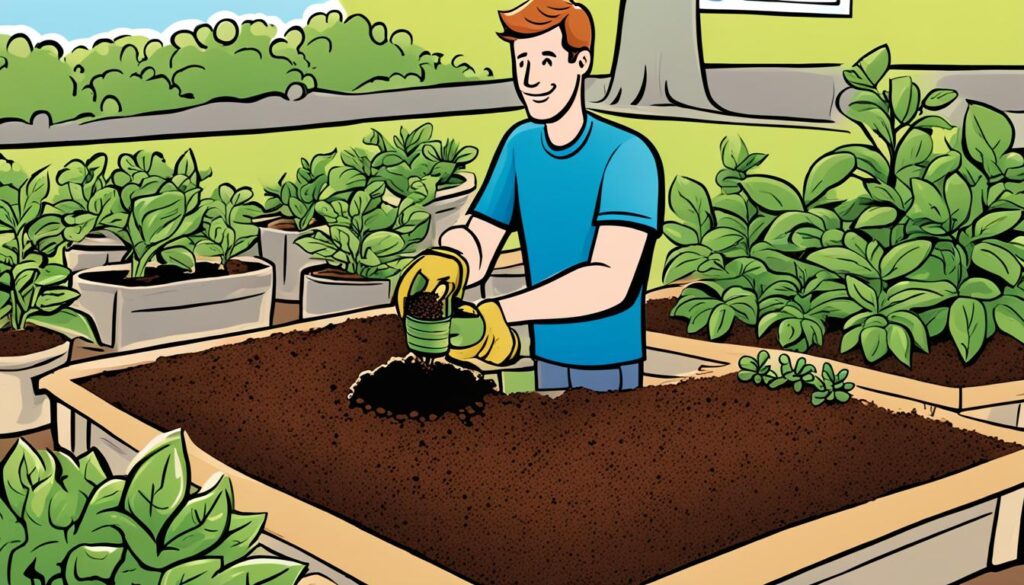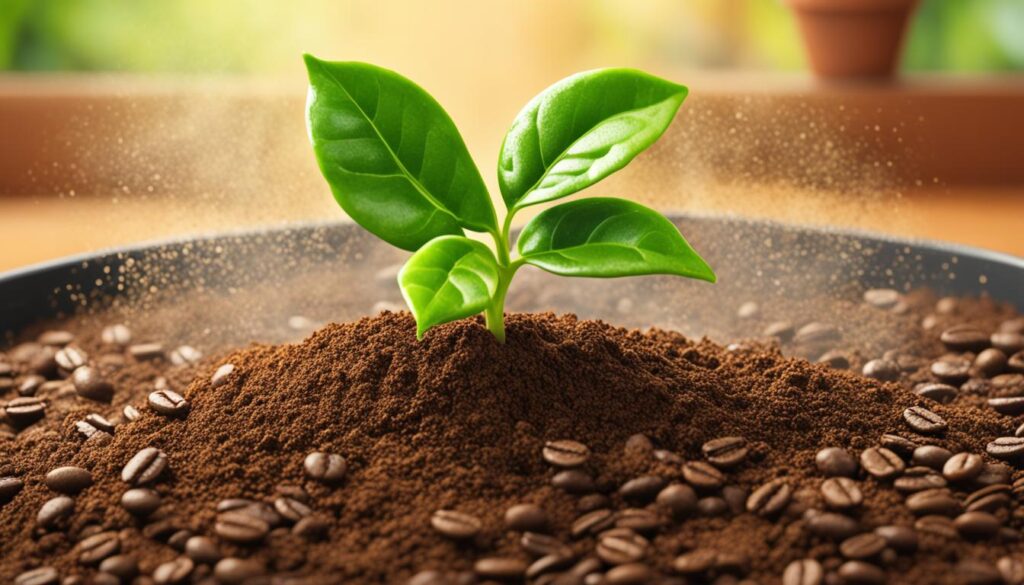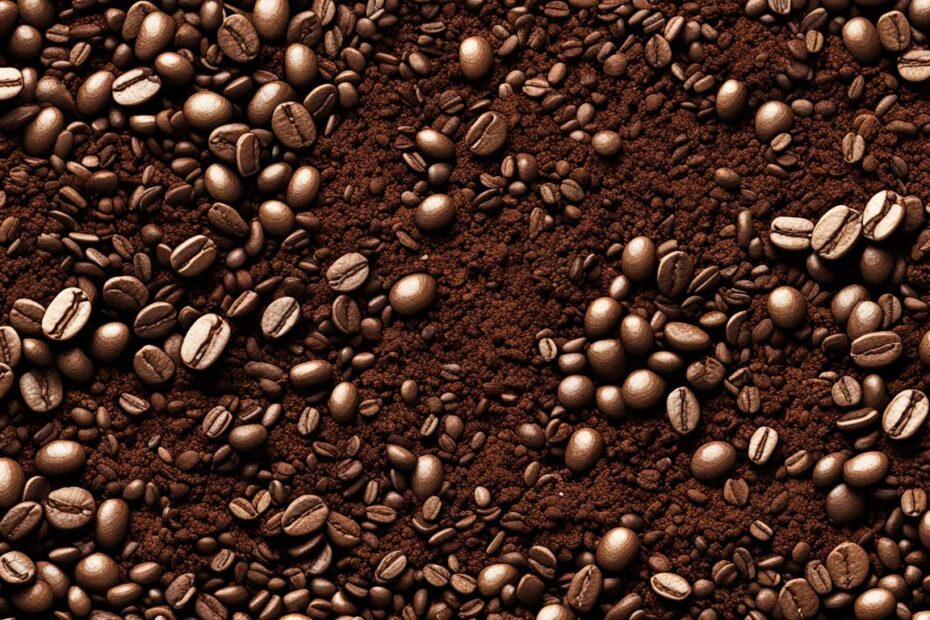Have you ever considered using coffee grounds in your garden? You may be surprised to learn that these common kitchen waste can be a game-changer for your plants’ growth and overall health. Coffee grounds are rich in essential nutrients and offer numerous benefits when incorporated into the soil. So, how can coffee grounds help unlock the potential of your plants? Let’s delve into the wonderful world of coffee grounds and discover their hidden powers for your garden.
Key Takeaways:
- Coffee grounds are a valuable resource for enhancing plant growth and vitality in your garden.
- They are rich in essential nutrients such as nitrogen, phosphorus, and potassium, which are essential for healthy plant growth.
- Coffee grounds improve soil structure, act as a natural slow-release fertilizer, and deter pests.
- They can be used as mulch, mixed into the soil, or added to compost to enrich its nutritional value.
- Coffee grounds are particularly beneficial for acid-loving plants and can help maintain the ideal pH balance.
The Nutritional Benefits of Coffee Grounds
Coffee grounds are a nutrient powerhouse for plants. They contain valuable elements such as nitrogen, phosphorus, and potassium, which are essential for healthy plant growth. Nitrogen promotes lush foliage, phosphorus aids in root development, and potassium strengthens overall plant health.
You can unleash the power of coffee grounds by incorporating them into your gardening practices. One way to utilize coffee grounds is by adding them to your compost pile. When coffee grounds break down, they enrich the compost with essential nutrients, creating a nutrient-rich soil amendment.
Another method is using coffee grounds directly on the soil around your plants. The slow-release nature of coffee grounds ensures a steady supply of nutrients over time, supporting continuous plant growth and vitality. When applying coffee grounds as a soil amendment, make sure to mix them in or cover them with a layer of organic matter to prevent them from compacting or clumping.
The Nutrient Composition of Coffee Grounds
To better understand the nutritional benefits of coffee grounds, let’s take a look at their nutrient composition:
| Nutrient | Composition |
|---|---|
| Nitrogen | 2.28% |
| Phosphorus | 0.06% |
| Potassium | 0.6% |
This table showcases the nitrogen, phosphorus, and potassium content in coffee grounds, highlighting their significance as a natural source of these essential plant nutrients.
When using coffee grounds, it’s important to note that they should not be the sole source of nutrients for your plants. They should be used in combination with other organic materials and fertilizers to provide a balanced nutrient profile.
Using Coffee Grounds in Your Garden
Coffee grounds are not only a great source of nutrients for your plants, but they can also be used in various ways to improve your garden’s health and productivity. Whether you want to suppress weeds, retain moisture, or provide the ideal growing conditions for certain plants, incorporating coffee grounds into your garden can be highly beneficial.
Mulching with Coffee Grounds
One way to utilize coffee grounds in your garden is by using them as mulch. Applying coffee grounds around your plants can help suppress the growth of weeds, preventing them from competing with your plants for essential nutrients and water. This natural weed barrier can save you time and effort in weed control, allowing you to focus more on the care and growth of your plants.
In addition, coffee grounds used as mulch can help retain moisture in the soil. They act as a protective layer, reducing water evaporation and maintaining a consistent level of moisture around the plant roots. This is particularly beneficial during hot and dry periods, as it helps prevent water stress and ensures your plants receive the hydration they need to thrive.
CHECK OUR RECOMMENDED PRODUCTS
Incorporating Coffee Grounds into Soil
If you want to boost the overall health and fertility of your soil, mixing coffee grounds directly into the soil can be a great option. Coffee grounds are rich in organic matter and essential nutrients that can improve the soil structure and provide a nutrient-rich environment for your plants.
When incorporated into the soil, coffee grounds help improve its structure by enhancing its ability to retain moisture and promote proper drainage. This ensures that your plants’ roots have access to oxygen, water, and nutrients for healthy growth and development.
Furthermore, coffee grounds are particularly beneficial for acid-loving plants such as azaleas, rhododendrons, and blueberries. These plants thrive in acidic soil conditions, and coffee grounds can help maintain the ideal pH balance for them. By incorporating coffee grounds into the soil, you can create an optimal growing environment for these acid-loving plants, ensuring they receive the necessary nutrients to flourish.
A Table of Acid-Loving Plants:
| Plant | Optimal Soil pH Range |
|---|---|
| Azaleas | 4.5-6 |
| Rhododendrons | 4.5-6 |
| Blueberries | 4-5.5 |
Benefits of Coffee Grounds for Acid-Loving Plants:
- Helps maintain the ideal pH balance for these plants.
- Provides essential nutrients for healthy growth.
- Improves soil structure and nutrient availability.
It is important to note that while coffee grounds provide numerous benefits to your garden, they should be used in moderation. Excessive use of coffee grounds can lead to over-acidification of the soil, which may be detrimental to the overall health of your plants. To avoid this, mix coffee grounds with other organic matter and monitor the pH level of your soil regularly.
CHECK OUR RECOMMENDED PRODUCTSCoffee Grounds as a Pest Deterrent
Coffee grounds are not only beneficial for plant growth but also serve as a natural remedy for keeping pests at bay. Their strong scent and texture make them an effective deterrent against slugs, snails, and ants. By sprinkling coffee grounds around your plants or creating a perimeter line in your garden, you can create a barrier that pests will avoid.
The scent of coffee grounds acts as a repellent, discouraging pests from approaching your precious plants. Additionally, the grittiness of the grounds can deter pests from crawling across them, further protecting your garden.
To repel slugs and snails, simply scatter coffee grounds around the base of plants or create a protective circle. The sharp particles in the grounds irritate their soft bodies, deterring them from crossing the barrier and causing damage. Coffee grounds can also be particularly effective against ants, disrupting their scent trails and discouraging their presence.
Using coffee grounds to repel pests is a natural and eco-friendly alternative to harmful chemical pesticides. It not only helps protect your plants but also contributes to the sustainability of your garden.
It’s important to note that while coffee grounds can be effective pest deterrents, their effectiveness may vary. Some pests may become accustomed to the scent over time, requiring more frequent application. Therefore, it’s recommended to regularly replenish coffee grounds around your plants for optimal pest control.
Collecting and Storing Coffee Grounds
To fully benefit from coffee grounds, it’s important to collect and store them properly. Here are some tips to help you gather and preserve coffee grounds for your garden:
- Collect from your own kitchen: Start by saving the leftover coffee grounds from your morning brew. After enjoying your cup of joe, simply transfer the used coffee grounds into a designated container.
- Ask local coffee shops, cafes, and restaurants: Many establishments discard large amounts of coffee grounds daily. Reach out to your favorite coffee spots and ask if they’d be willing to share their used coffee grounds with you. They may be happy to provide you with a steady supply of this valuable resource.
- Store in an airtight container: To preserve the freshness of the coffee grounds, transfer them into an airtight container. This will help retain their beneficial properties and prevent moisture or odors from affecting their quality.
- Choose a cool, dry place: Find a suitable spot in your kitchen or pantry to store the container of coffee grounds. Keep them away from direct sunlight and excessive heat, as these can degrade the quality of the grounds.
- Add to compost bins or vermicomposting systems: If you have a compost bin or vermicomposting system, consider adding coffee grounds to enrich the soil. Coffee grounds are a fantastic addition to compost, adding valuable nutrients and promoting healthy microbial activity.
By following these simple steps, you can ensure that you have a steady supply of coffee grounds for your garden. Whether you collect them from your own kitchen or seek them from local establishments, coffee grounds are a sustainable and beneficial resource for enhancing your plants’ growth and vitality.
CHECK OUR RECOMMENDED PRODUCTSIncorporating Coffee Grounds into Your Plant Care Routine
There are various ways to incorporate coffee grounds into your plant care routine. These grounds can be reused and repurposed to provide numerous benefits to your garden. Let’s explore three popular methods: composting coffee grounds, making coffee grounds tea, and using coffee grounds in potting mixes.
Composting Coffee Grounds
Composting coffee grounds is a great way to enhance the nutrient content of your compost and create a nutrient-rich soil amendment. Coffee grounds are rich in nitrogen, making them an excellent source of organic matter. They help promote microbial activity in the compost, aiding in the breakdown of other organic materials and accelerating the decomposition process. By incorporating coffee grounds into your compost, you’ll create a valuable resource that can be added to your garden beds or used as a top dressing around plants.
Making Coffee Grounds Tea
Another option is to make a coffee grounds tea by steeping them in water. This brewing process extracts the nutrients from the coffee grounds, creating a nutrient-dense liquid that can be used in different ways. Coffee grounds tea can be used as a foliar spray, providing plants with a direct and immediate nutrient boost. Simply strain the brewed liquid and transfer it to a spray bottle. Spray the diluted tea onto the leaves of your plants, ensuring full coverage. Alternatively, you can apply the tea directly to the soil around your plants, enhancing nutrient availability and promoting healthy growth.
Using Coffee Grounds in Potting Mixes
Coffee grounds can also be beneficial when incorporated into potting mixes for indoor plants. Adding a small amount of coffee grounds to potting mixes improves soil structure and nutrient availability. The organic matter in the coffee grounds helps retain moisture in the soil, preventing over-drying. Additionally, the slow release of nutrients from the coffee grounds ensures a steady supply of essential elements for your potted plants. Just remember to use coffee grounds in moderation, as excessive amounts can lead to nutrient imbalances and affect plant health.
| Methods | Benefits |
|---|---|
| Composting coffee grounds | – Enhances nutrient content of compost – Promotes microbial activity – Adds organic matter to garden beds |
| Making coffee grounds tea | – Provides a nutrient-rich foliar spray – Enhances nutrient availability – Promotes healthy plant growth |
| Using coffee grounds in potting mixes | – Improves soil structure – Enhances moisture retention – Releases nutrients gradually |
Choose the method that best fits your gardening needs and experiment with incorporating coffee grounds into your plant care routine. By doing so, you’ll not only reduce waste but also maximize the benefits of this versatile resource.

Enhancing Nutrient Absorption and Soil Structure with Coffee Grounds
Coffee grounds offer numerous benefits when it comes to improving soil health and providing optimal conditions for plant growth. By incorporating coffee grounds into your garden, you can enhance nutrient absorption, promote healthy root growth, and regulate soil moisture levels.
Promoting Healthy Root Growth
When coffee grounds are added to the soil, they work wonders in creating a favorable environment for root development. The rich organic matter in coffee grounds improves soil structure, providing a loose and well-aerated medium for roots to penetrate easily. This results in healthier root systems, allowing plants to effectively absorb nutrients and thrive.
Improving Soil Structure for Nutrient Absorption
The texture of the soil plays a vital role in nutrient absorption by plant roots. Coffee grounds act as an excellent soil amendment, enhancing the overall structure of the soil. When incorporated into the soil, coffee grounds help break up compacted soil, allowing for better water penetration. This, in turn, facilitates the movement of nutrients to the root zone, ensuring plants receive the vital elements they need for optimal growth.
Regulating Soil Moisture Levels
Coffee grounds have unique moisture-regulating properties that can benefit plants, especially in areas prone to waterlogging or dry spells. The organic matter in coffee grounds acts as a moisture retainer, helping to regulate soil moisture levels. This prevents waterlogging during periods of heavy rain and maintains an ideal moisture balance during drier periods. By retaining moisture, coffee grounds contribute to healthy plant hydration and reduce the risk of over or under-watering.
An Example of How Coffee Grounds Enhance Nutrient Absorption and Soil Structure
| Nutrient Absorption | Soil Structure |
|---|---|
|
|
By using coffee grounds in your garden, you can unlock the potential for optimal nutrient absorption and soil structure. Whether you’re growing vegetables, flowers, or ornamental plants, incorporating coffee grounds into your plant care routine is a natural and sustainable way to foster healthy plant growth.
Conclusion
Coffee grounds are an invaluable resource for promoting plant growth and ensuring healthy, vibrant plants in your garden. With their abundance of nutrients, coffee grounds act as a natural slow-release fertilizer, providing essential elements like nitrogen, phosphorus, and potassium. These nutrients are crucial for robust foliage, strong roots, and overall plant health.
Not only do coffee grounds nourish your plants, but they also improve the structure of the soil, allowing better water penetration and nutrient absorption. Their organic matter enhances soil texture, creating a loose and well-aerated environment for optimal root growth. Additionally, coffee grounds serve as a reliable pest deterrent, repelling unwanted visitors like slugs and ants due to their strong scent and texture.
To incorporate coffee grounds into your gardening routine, use them in moderation and be mindful of the soil’s pH level. Coffee grounds work best when applied as mulch, mixed into the soil, or added to compost. Their benefits extend to acid-loving plants, such as azaleas and blueberries, and can support a wide variety of plant species.
So, seize the opportunity to unleash the full potential of your garden by harnessing the power of coffee grounds. From promoting healthy plant growth to improving soil structure and deterring pests, coffee grounds are a game-changer for your gardening endeavors. Discover the benefits of using coffee grounds and watch with delight as your plants thrive like never before.
FAQ
How can coffee grounds benefit my garden?
Coffee grounds are rich in essential nutrients such as nitrogen, phosphorus, and potassium, which promote healthy plant growth. They can improve soil structure, act as a slow-release fertilizer, and deter pests.
How can I use coffee grounds in my garden?
Coffee grounds can be used as mulch to suppress weeds and retain moisture. They can also be mixed into the soil to improve its structure and nutrient content. Coffee grounds are particularly beneficial for acid-loving plants like azaleas and blueberries.
Can coffee grounds help repel pests in my garden?
Yes, coffee grounds have natural pest deterrent properties. They can repel slugs, snails, ants, and certain garden pests due to their scent and texture. Sprinkling coffee grounds around plants or creating a perimeter line can help keep pests away.
How should I collect and store coffee grounds for gardening?
You can collect coffee grounds from your own kitchen or ask coffee shops and restaurants for their used grounds. Store them in an airtight container in a cool, dry place to preserve freshness. You can also add coffee grounds to compost bins or vermicomposting systems.
What are some ways to incorporate coffee grounds into my plant care routine?
You can compost coffee grounds to enrich your compost and create nutrient-rich soil. Making coffee grounds tea by steeping them in water is another option. You can use this tea as a foliar spray or directly apply it to the soil. Coffee grounds can also be added to potting mixes for indoor plants.
How do coffee grounds enhance nutrient absorption and soil structure?
When incorporated into the soil, coffee grounds improve its texture, allowing for better water penetration and nutrient absorption. They promote healthy root growth by providing a loose and well-aerated environment. Coffee grounds also help regulate soil moisture levels.
What are the overall benefits of using coffee grounds in gardening?
Coffee grounds are a valuable resource for enhancing plant growth and vitality. They provide essential nutrients, act as a natural fertilizer, improve soil structure, and deter pests. By using coffee grounds, you can unlock the full potential of your plants and create a thriving garden.
